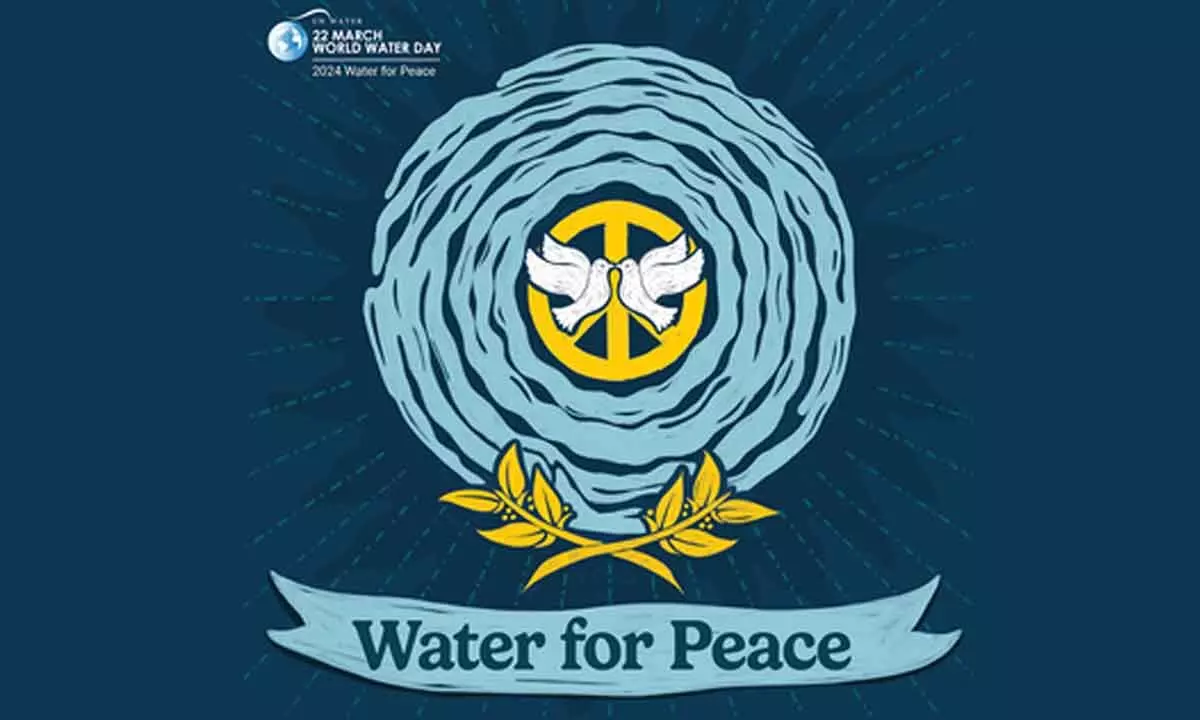‘Water for Peace’ must be the governing mantra to ensure equitable distribution of the elixir of life
Bore wells dug to supplement availability of water have gone deep and in some cases dry
image for illustrative purpose

Only 24 countries have water sharing agreements. Food and energy supply, public health and prosperity, industrial growth, economic prosperity, the entire ecosystem and environmental integrity rely on an equitably managed water cycle
It is appropriate for the world to celebrate World Water Day as ‘Water for Peace’ as we all understand the importance and significance of water in everybody's life as well as to maintain and preserve the nature's beauty. All living things depend on water for survival.
However, mankind has not taken care of such valuable resources and sources of availability of water, its pace or path of flow and movement and its judicious use. Instead there is a substantial wastage of water, water getting polluted due to release of chemicals and poisonous substances into rivers or lakes; closing of lakes and wells due to real estate or industrial activities without any planning for such water storage lakes and unauthorised usage of water as well as putting hurdles in free movement of water in rivers have resulted in most of the sources becoming dry.
The bore wells dug to supplement availability of water have gone deep and in some cases dry.
It is time there is a clear action plan to preserve all sources of water and stringent action is taken against those who cause harm to rivers and other sources or pollute water.
There have been greater incidents of climate change affecting the rainfall patterns with scarce or deficient rainfall or excess rainfall without facilities for rain harvesting. More and more emissions may lead to further adverse impact on climate change; 2023 was the hottest year in recent times. More such climate extremes lead to non-availability of water, reservoirs, rivers and lakes dry up, which along with rain uncertainties add to human sufferings.
In places with heavy density of population, it becomes a burden to authorities to ensure availability of water.
Inter-movement of water between cities, states and countries calls for cooperation, understanding and agreements for a judicial use of water from the source of river into its final destination.
This is where the importance of ‘Water for Peace’ becomes more relevant as water sharing treaties and agreements have to be honoured and adhered to.
According to the United Nations, more than three billion people worldwide depend on water that crosses national borders. Yet, only 24 countries have water sharing agreements.
Food and energy supply, public health and prosperity, industrial growth, economic prosperity, the entire ecosystem and environmental integrity rely on an equitably managed water cycle. However human greed, combined with misuse of power, war and conflicts have negative impacts. Hence, there is an urgent need for all nations to strive together for protecting and conserving our most precious and essential resource ‘water’.
Goal 6 of Sustainable Development Goals is "Ensure access to water and sanitation for all." Access to water, sanitation and hygiene is the basic human need for a healthy life. It is therefore imperative for all nations to strive for peaceful utilisation of the scarce commodity and work towards infrastructure and investment towards restoration of water related ecosystems. In order to ensure universal access to safe and affordable drinking water for all by 2030, there is a need for cooperation and mutual understanding amongst all nations.
According to United Nations Report, this mutual cooperative will create a positive ripple effect - fostering harmony, generating prosperity and building resilience to shared challenges. Water is a basic necessity and intrinsic to every aspect of life. In order to ensure current and future generations enough supply and availability of safe and hygienic water all nations must unite around water and use it for peace, which alone can ensure a stable and prosperous tomorrow.
Water when not adequately preserved and water regenerating capacity not attended to and the consequences adversely impact on water availability. There may be regional variations in natural water resources and some nations with dense population but less than required water can also create trouble for all living beings.
According to some estimates, half a billion people live in areas with severe water scarcity throughout the year and around four billion people face severe water scarcity at least one month per year. Half the world largest cities experience water scarcity. There are 2.3 billion people who reside in nations with water scarcities and 2.4 billion people suffer from contamination of water and poor sanitation.
According to the World Bank, "to guide effective climate change adaptation, activities should reflect the importance of water management for reducing vulnerabilities and building climate resilience, which can be attained by watershed management, sustainable infrastructure and empowerment and through adaptive institutions.
For inclusive growth and equity growth, there is a need for adequate and equitable sanitation and hygiene for all by 2030.
India is the world's largest populated country and we experience instances of water stress, inadequate access to water, unsafe water due to contamination, and as the demand is to get the double the amount available as we go forward, we have to preserve natural water, enhance ground water availability, harvest rainwater, and avoid misuse or over exploitation of water. We need to learn to recharge water, agriculture crop patterns and proper care to preserve soil and water. The policy action from the government should be coupled with citizens’ awareness and commitment to preserve and enhance water. Going forward this will be a major action point for all of us.
(The author is former Chairman & Managing Director of Indian Overseas Bank)

